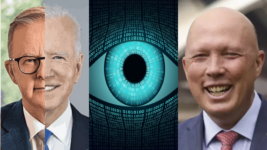The Majors to Crackdown on Internet Freedoms, as Mainstream Disinformation Peaks

The catastrophe in Gaza has brought the issue of mis- and dis-information into stark relief, as major media players in this country, and right across the western world, have been producing a sanitised version of events that convey a false narrative to the public, which is certainly not in its interest.
Recent weeks have seen the supposed bastion of genuine news broadcasting in Australia, the ABC, sack a journalist for posting factual information about Israel using starvation as a tool, whilst it’s been criticised for not prioritising coverage of South Africa’s genocide case against Israel.
Meanwhile, there’s been a seismic shift in people mobilising for Palestine. And this outpouring, which is calling for an end to the wholesale massacre of Palestinians in Gaza, has either been condemned as antisemitic by ministers or ignored, as if this ever-swelling movement doesn’t exist.
Just months prior to Israel unleashing its attacks upon the civilian population of Gaza, which has thus far killed over 24,000 Palestinians and has been deemed self-defence by the western political class, our government released draft legislation to combat falsehoods being spread on the web.
And get this, these laws that crack down on internet freedoms, which even in the draft stage have bipartisan approval, will not apply to “professional news content”, meaning the mainstream media, or “authorised electoral content”, which is government information notorious for being cooked.
Erasing unofficial narratives
The exposure draft of the Communications Legislation Amendment (Combatting Misinformation and Disinformation) Bill 2023 was published on 24 June last year, with shadow communications minister Dave Coleman, outlining the next day, that the Coalition first proposed the laws in March 2022.
Indeed, this nation has already required industry to develop its own voluntary set of standards, with the DIGI Code (the Australian Code of Practice on Disinformation and Misinformation) having been in operation since February 2021, with eight major platforms, including Facebook and X, complying.
However, communications minister Michelle Rowland told an International Institute of Communications, Telecommunications and Media Forum meeting in Sydney last August that she plans on arming the Australian Communications and Media Authority with “reserve powers”.
“We want to boost the powers of the ACMA to hold digital platforms to account by strengthening and building upon” the DIGI Code, the minister explained, which will involve “graduated reserve powers to ask industry to make new, registrable codes, or, if necessary, to impose standards”.
In citing Facebook CEO Mark Zuckerberg as an inspiring the “new rules”, Rowland insisted that the focus will be on “digital platforms”, in terms of ensuring factchecking and “authoritative sources” and she added “professional news, satire, and private messages” will be outside of its scope.
Bankrupting alternate media
The draft exposure of the bill was open for submissions for six weeks in mid-2023, and the final draft of the bill is yet to be tabled in federal parliament. But it’s expected it will be introduced, undergo debate in the chamber and then be sent for parliamentary committee review early this year.
In terms of the ACMA powers, the media monitor will be able to approach nonmainstream, nongovernment digital platforms that it considers might be propagating fake news to ensure they don’t. ACMA can then gather information on sites or require them to keep records on suspect news.
If ACMA considers one section of the digital platform services industry is presenting suspect versions of the truth, it can direct bodies and associations to develop an online code of conduct for that sector, with the statutory body then empowered to register the rules and enforce them.
However, if ACMA considers a specific digital service provider or an online sector isn’t complying with an industry-developed code, the government authority can then develop and enforce its own industry standard, which, unsurprisingly, will involve stronger regulations.
The misinformation legislation also proposes two new criminal offences, which are designed to completely cripple any online information provider, whose general positions don’t reflect the official government narrative in this country, via the imposition of draconian penalties.
For noncompliance with a registered code that’s been developed by industry, a digital platform service provider found in breach faces a maximum fine of $3.13 million or 2 percent of the offending corporation’s global turnover, while individuals would face up to a $626,000 penalty.
Noncompliance with an industry standard, however, is a much more serious offence, which would carry a $7.825 million fine for a corporation or 5 percent of its global turnover, while individuals would be liable to a fine of up to $1.565 million.
A few home truths
Prior to Israel’s genocidal slaughter in Gaza, these proposed ACMA reserves powers were being criticised as a means for Australian authorities to keep a hold on the mainstream narrative, to reinforce themselves as the determiners of truth and to wipe out dissenting voices.
Yet, since Israel began its assault on the 2.3 million Palestinians in the walled-in Gaza Strip, it would appear that these laws are actually designed to combat the government’s loss of control over the official narrative, as online counternarratives presenting on-the-ground truths are gaining traction.
This reading of events is supported by the large numbers mobilising in this country, across the Anglosphere and in Europe, in aid of the Palestinian cause, even though the western political class has slandered demonstrations, denied their existence and in some jurisdictions banned them.
Even a list of examples of “harms” that the laws are supposed to combat show that government is one of the biggest producers of falsities, as mistruths about ingesting bleach, foiling impartiality of elections and dodgy water-saving measures in droughts, are all the work of politicians.
So, it would seem in a sense that the horse has already bolted on this issue, as, while laws that prevent the free flow of information online may still be enacted, the understanding that the mainstream media narrative follows that sanctioned and produced by the government is clear.
And as the approved narrative has recently been exposed as flawed to a much larger portion of the constituency since the catastrophe broke in Gaza, band-aid measures to silence divergent voices won’t be able to counter the seed of understanding that’s already been planted in the people.







